Effective Tips to Help Your Toddler Take Their First Steps
Share
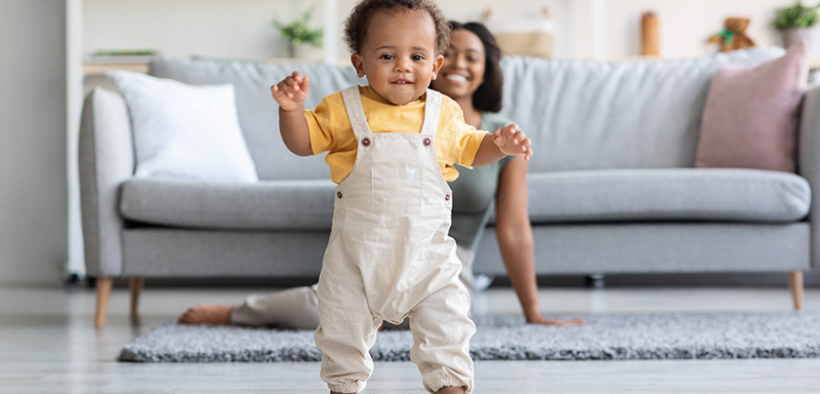
Being a parent, you always dream of being there and witnessing the time when your kid walks for the first time. Your baby or the toddler walking is one the most important moments in a parent’s life, and they’ll cherish it forever. They would capture the moment by recording the walk and clicking photographs.
It always makes parents happy when they witness their child crawling toward them, smiling, and playing with them, isn’t it? But sometimes parents don’t have much idea about when’s the right time for their kid to start walking. Parenting can be tough, and guiding and helping your child to walk can be new for parents.
So, in this article, I’ll tell you everything you want to know about your baby starting to take his first steps. I’ll also tell you about the factors that affect your baby’s first steps as well and I’ll give you 15 tips that’ll get your toddler walking.
Let’s get started!
What are the Factors that Determine a Baby’s First Walk?
Many factors determine your toddler’s first walk, but some of them are important. I’ll help you determine those factors below.
- Age range: Usually, a baby starts walking between 6 to 13 months, and the CDC (Centres for Disease Control and Prevention) states that the general age for a toddler to walk is 12 to 18 months. However, the average age of independent walking in the United States is 12 months.
- Developmental Milestones: Everything has a time of its own, and the same goes with your babies too.
- Physical Development: Another important factor that determines the first walk of your baby is physical skills like balance coordination, muscle strength, and the ability to shift the body weight from one leg to another. These skills will help your baby to engage in different activities like crawling and standing while holding the furniture.
- Individual Variation: Every single kid is different and has different genetics and temperament. Some babies can easily start walking within the first 9 months, whereas some might even take time till they are 18 years old.
- Supportive Environment: Providing a safe environment where the baby can explore the room without hurting himself plays an important factor. This supportive environment contributes a lot to the baby getting ready to walk. This will also give them a lot of confidence and physical abilities.
Tips to Get Your Toddler Walking
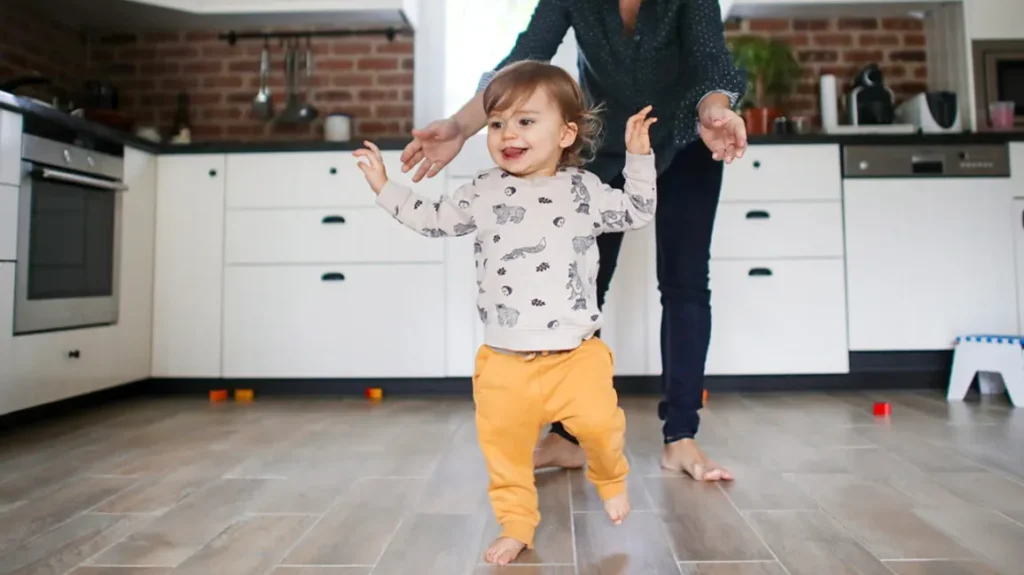
- Assisted Walking: Assisted walking is a very common tip as well and you’ll find many parents do it with their kids while playing with them. If you still don’t know about it, let me tell you. You have to stand behind your baby and hold their hands while helping them take steps. This will help them practice walking with your support.
- Cruising: Take any furniture, be it a chair or a small table, and then allow your baby to hold onto the furniture and cruise along. This will help your toddler to learn how to build balance and also will help in gaining confidence in walking. But you need to make sure to be careful around your baby just to make sure he’s safe.
- Sitting on a Stool: As we discussed earlier, around 6 months, your baby will start sitting on his own, and as soon as they do it without support, try to make them sit on a stool without back support. Also, encourage them to pick their toys from their floor, which will strengthen their leg, back, and shoulder muscles. These types of exercises will provide enough confidence for your baby to stand and start walking.
- Use Toys: Try to intentionally keep their toys slightly out of their reach and motivate them to move on their own and get their toys. Having you encourage them, they will start taking steps, and slowly you’ll find your baby walking.
- Bouncing Exercises: Another great exercise will be to let your kids bounce on your lap with their feet on your legs. This exercise will help them gain more strength in their leg muscles to stand and move on their own.
- Barefoot Exploration: This is one of my favorite tips, which suggests you keep your kid barefooted. This will help your baby feel the surface and develop a better posture which will later improve balance and walking skills.
- Dance: Babies love music, and they respond quicker when there’s music playing in the background. Hit music and encourage your kid to get up and dance. Music will help them move their legs which will be another form of exercise, and it’ll be in a fun way.
- Encourage Standing: Encouraging your kid is another way to help your baby stand and walk. Motivate them to pull themselves up and to take steps while taking support of furniture gradually.
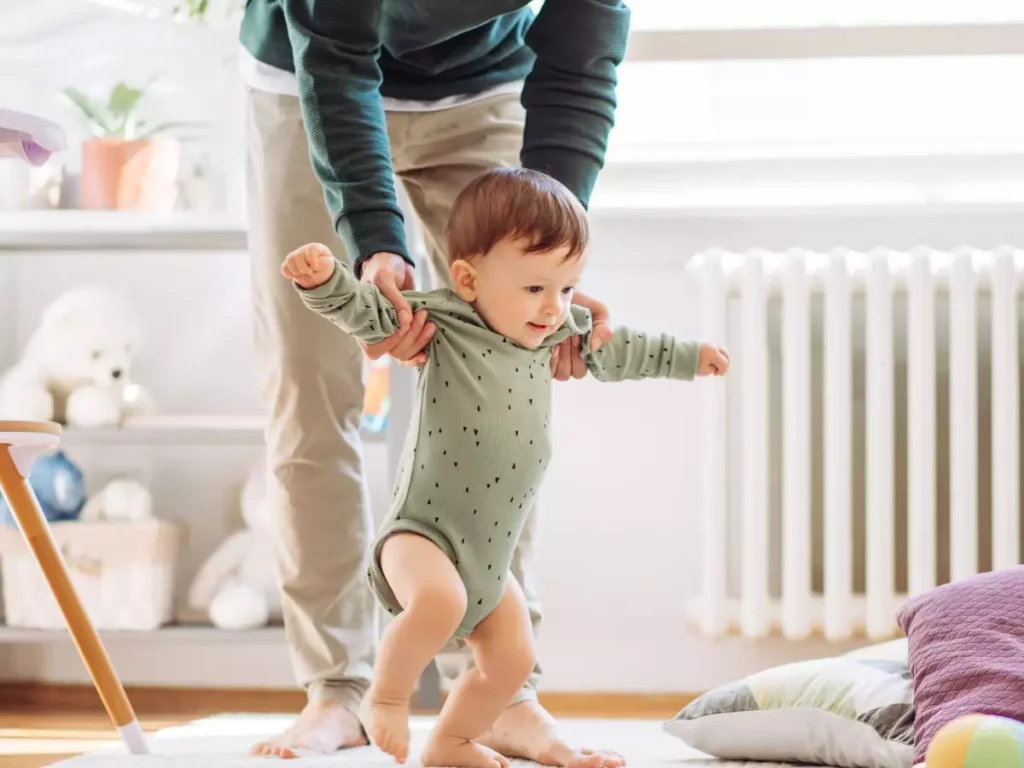
- Set up Childproofing: The day your kid is born, you should make sure that your house is childproof from all the pointy corners and hazards to prevent the risk of injuries. There are many products in the market to cover all the pointy and edgy corners of your house.
- Practice Knee Bending: Another important exercise for your baby is to teach how to bend their knees while standing up and sitting down. This is an important exercise as well as movement for walking development.
- Stand and Squat: Another common exercise that you and your kid can do together is by making them stand and squat. This exercise is another great way to build the leg muscles of the baby. If they can’t do it on their own, then be there to hold their arms for support. It’s an important skill for your baby to stand on their own.
- Patience and Encouragement: If you want to be a good parent, then you need to learn these two skills first. Learn to be more patient around your kids and encourage every single action of theirs. Making your kid stand and walk can be very time but you need to be patient and appreciate every single progress of your baby.
- Take them to Daycare: Babies are known for copying and replicating the people around them, so it’ll be a great tip for you to take your baby to daycare. There, your baby will watch and observe other kids walking and running, which will push them to do the same. They also might watch other babies of their own age get up and fall back down again but still get encouraged. This will definitely motivate them to do the same.
- Avoid Walkers: Walkers can easily slow down the progress of your kid walking confidently without using support. Your baby will slowly get used to walking with the help of walkers. So shifting from a walker to walking without any support will be quite difficult for them.
- Physical Games: The Final tip for you will be to engage your kid in as many physical activities as possible. Especially let them play football by trying to kick the ball on their own. This will push them to stand up and kick just like others. These games and exercises will overall contribute to the muscle development of your baby.
Conclusion
Parenting is a tough job as it is a roller coaster ride of mixed emotions, which includes frustrations, late-nighters, happiness, etc. But one of the best things about parenting is making memories with your baby. Your baby’s first smile, first crawl, first walk, etc., will always be memorable for a parent.
In this article, we discussed the factors that determine your child’s first walk, as well as 15 tips that will help your kid start walking faster.





![Top 10 April 2024 Calendar Templates [Printable]](https://www.letsmama.com/wp-content/uploads/2023/11/Top-10-April-2024-Calendar-Templates-Printable-80x80.jpg)



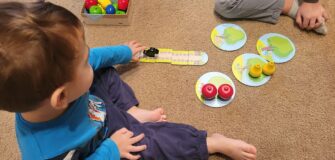

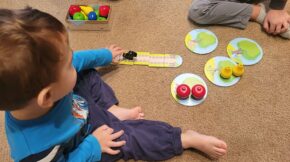


![Top 10 April 2024 Calendar Templates [Printable]](https://www.letsmama.com/wp-content/uploads/2023/11/Top-10-April-2024-Calendar-Templates-Printable-290x162.jpg)
